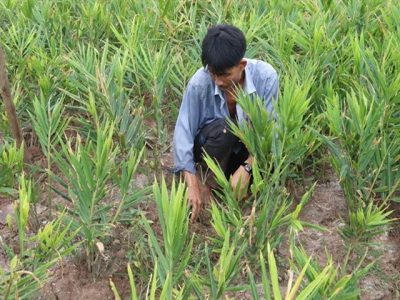Islet district develops specialised farming areas to adapt to climate change

TIỀN GIANG — Tân Phú Đông, an islet district in the Cửu Long (Mekong) Delta province of Tiền Giang, has developed specialised farming areas to enable local farmers to adapt to climate change.
A ginger field in Tân Phú Đông District’s Phú Thạnh Commune in Tiền Giang Province. It used to be an unproductive rice field which supported only one crop a year. — Photo Minh Trí
Located in the downstream area of the Tiền River, a tributary of the Mekong, the district is often affected by severe saltwater intrusion during the dry season.
The agrarian district is also one of Tiền Giang’s poorest.
Since its creation in 2008, the district has been zoning areas for aquaculture and crops like lemongrass, soursop and coconut, which grow well in local conditions.
Nguyễn Văn Hải, head of the Tân Phú Đông Bureau of Agriculture and Rural Development, said the district has determined it would develop its agriculture based on aquaculture and specialised farming areas.
The area under coconut area has grown from 500ha in 2008 to 1,200ha now while that under soursop has increased from 260ha to 780ha, mostly in Tân Thới, Tân Phú and Tân Thạnh communes.
There are 7,050ha of aquaculture ponds, twice the area in 2008.
It has 1,900ha of lemongrass, the largest area in the province, comprising mostly lands that used to be low-yield rice paddies that grew only one rice a year.
The district has developed Phú Tân into a specialised aquaculture commune that breeds shrimp using intensive and extensive farming methods and rotates between rice and shrimp in the same fields.
Phú Tân has 500ha under the rotation model.
Hà Văn Hải was one of the first farmers to adopt it. He breeds shrimp and mud crabs on his 5ha field in the dry season and rice in the rainy season to earn VNĐ360-400 million (US$15,300-17,000) a year.
The rotation model has helped his family become well off, he said.
He is the head of the commune’s aquaculture co-operative group which has 31 members and a total of 115ha of land under the rotation model.
It produces clean rice and shrimp since farmers do not use a lot of chemicals on their lands.
Local farmers have also adopted the garden - pond - livestock pen model to improve their income.
Lê Công Lữ has 6.5ha in Phú Đông Commune’s coastal area which regularly suffers from saltwater intrusion.
He grows coconut and breeds goats since they both can cope with lack of water and inclement weather and earns more than VNĐ300 million ($12,780) a year.
Farmers in the district also use advanced farming techniques like integrated pest management, efficient irrigation and Vietnamese good agricultural practices.
Nguyễn Quốc Khánh, chairman of the Tân Phú Đông People’s Committee, said the development of effective farming models has helped reduce the district’s poverty rate to 16.3 per cent from 42.5 per cent in 2008.
The district has a population of 43,000.
To mitigate the impact of saltwater intrusion in Tân Phú Đông, the province is setting up local irrigation projects.
In the 2019-20 dry season, the province has invested VNĐ13.2 billion ($560,000) to dredge ditches in fields and build temporary saltwater prevention dams to protect nearly 3,000ha of vegetables, fruits, lemongrass and other crops.
The district targets outputs of 28,000 tonnes of lemongrass, 7,800 tonnes of soursop, 2,500 tonnes of vegetables and 23,00 tonnes of shrimp this year.
The district’s lemongrass was granted a collective brand name last year by the National Office of Intellectual Property.
Related news
 Trade Ministry proposes lifting rice export quota
Trade Ministry proposes lifting rice export quota According to the ministry, the export of rice will only be conducted through international border gates by road, rail, waterway, sea and air.
 China remains largest consumer of Vietnamese farm produce
China remains largest consumer of Vietnamese farm produce The opening four months of the year saw China import US$2.8 billion worth of agro-forestry-aquatic products from Vietnam
 Drastic changes needed in farming practices to access EU market
Drastic changes needed in farming practices to access EU market Farmers and cooperatives are advised to implement changes to their farming methods in an effort to meet the higher standards of the EU market.